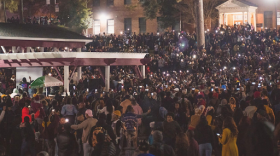Vice President Kamala Harris announced Wednesday new initiatives that will help historically Black colleges and universities that have received anonymous bomb threats in recent months.
The help will come in the form of grants that could range from $50,000-$150,000 per school to be used to support emergency planning, campus security and mental health services. HBCUs that have recently experienced a bomb threat resulting in a disruption to the campus learning environment will be eligible for grant funds.
These grant funds are from the Project School Emergency Response to Violence (Project SERV) program at the U.S. Dept. of Education.
North Carolina Central University was one of many HBCUs to receive bomb threats earlier this year. Harris said there have been as many as 80 threats made toward HBCUs and other minority institutions and places of worship this year. Other state HBCUs that received threats were Fayetteville State, Winston-Salem State, and Elizabeth City State universities.
In addition to the short-term funds provided through Project SERV, the Biden-Harris Administration will give HBCUs many resources that are available across the federal government to help with long-term improvements to campus mental health programs, campus safety, and emergency management planning and response.
"We gather united against violence and intimidation," Harris said at the White House event announcing the new initiatives. Other speakers included Attorney General Merrick Garland and Jackson State University President Thomas Hudson among others.
Hudson said the threats should be seen as a threat toward the nation as a whole. But he added that there are other obstacles that HBCUs continue to face.
"Decades of underfunding have hurt learning experiences," Hudson said.
Attorney General Merrick Garland said that 31 FBI field offices are working with local and state law enforcement to thwart and investigate threats against HBCUs.
At least 13 historically Black colleges received bomb threats on Feb. 1, the first day of Black History Month. Half a dozen others heard threats the day before.
NPR contributed to this story.
Editor’s Note: An earlier version of this story incorrectly stated how much grant money each school could receive under the new initiative. That amount is up to $150,000 per school.







